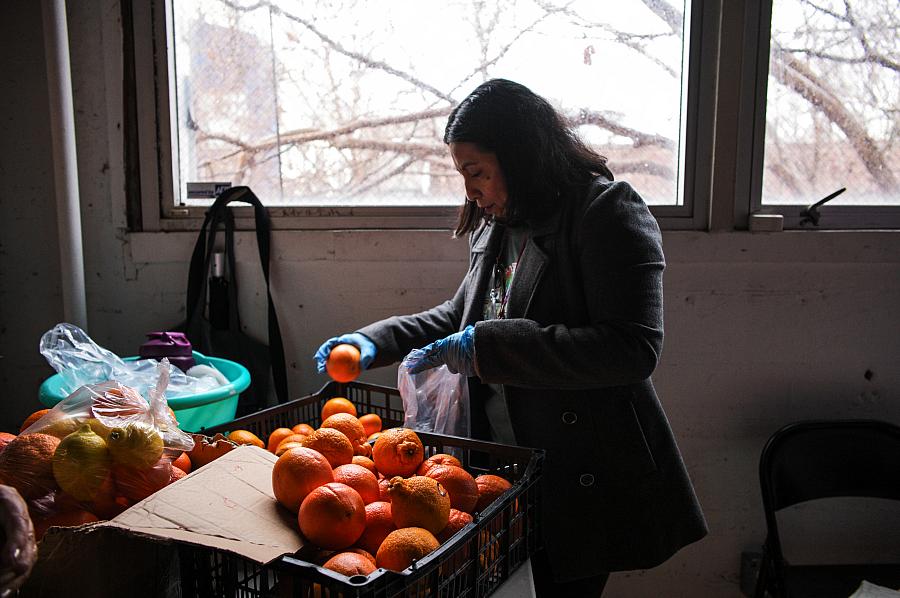From cold plunges to lotería, immigrant women are redefining mental health in S.F.
The story was co-published with El Tecolote as part of the 2025 Ethnic Media Collaborative, Healing California.
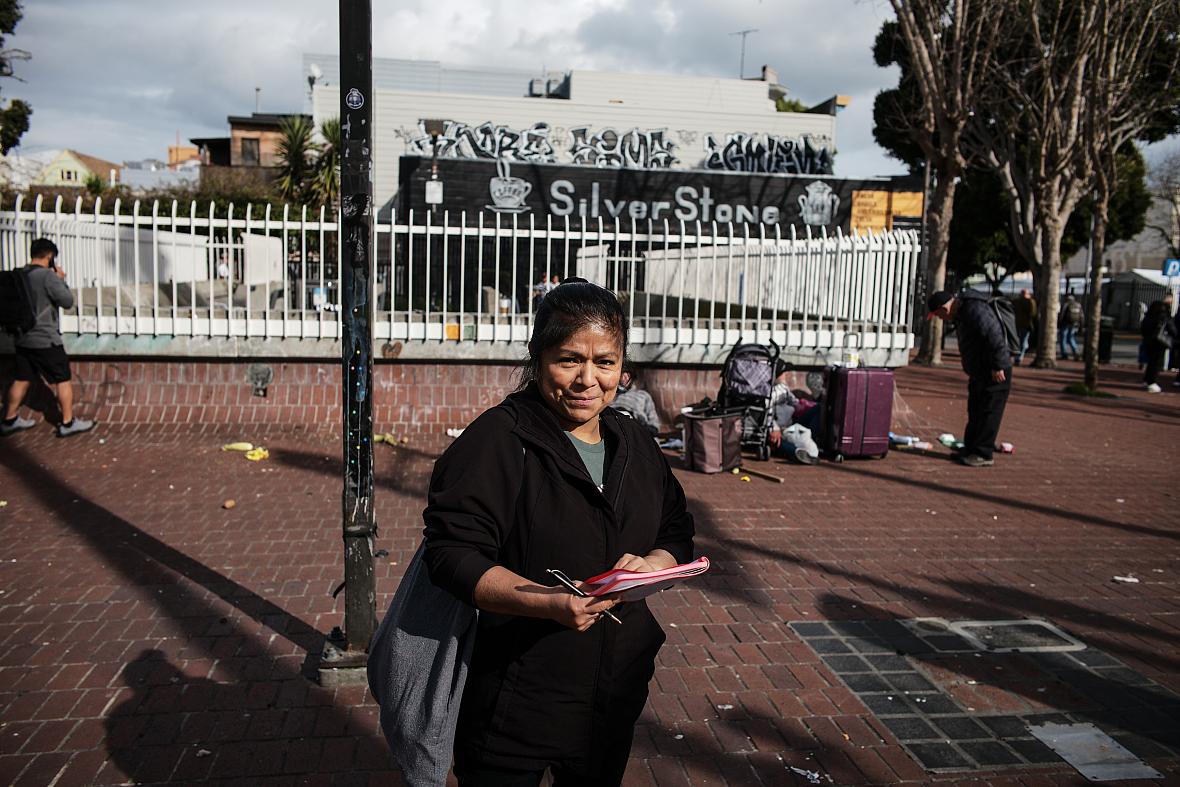
Ana A. waits for people to get off the bus to ask more long-COVID related questions for her research with Somos Remedios. Photo: Pablo Unzueta for El Tecolote/CatchLight Local
Ana A. still remembers how she felt when she got into the water. One day in late January, preparing for a makeshift cold plunge in her bathroom, she set aside a towel and warm tea, anticipating what she would need after the temperature shock. But as soon as she stepped into the cold shower, her mind took her somewhere else — to the day she was detained by immigration officers.
“They gave me a uniform and told me to take a shower, and to put on clean clothes. And the water is cold. It’s really cold,” said Ana, a domestic worker and community organizer from Guatemala. “It felt like they saw us as something dirty, something contaminated … I wouldn’t even be able to begin explaining the feeling — that I was locked up, away from my son.”
A few Mondays later, Ana was able to process these memories in a meeting with a group of other immigrant Latina women exploring how traditional remedies can support mental health. From acupuncture to hikes in the forest, they are weaving their own experiences into a growing body of community research.
In January, the group explored the benefits of cold water immersion, a popular practice associated with positive mood shifts. Testing it themselves, some members ventured to Ocean Beach, holding each other as the cold waves crashed around them. Ana, who couldn’t make it to the beach, tried her own immersion at home, a process that reawakened difficult memories.
It also opened a space for healing.
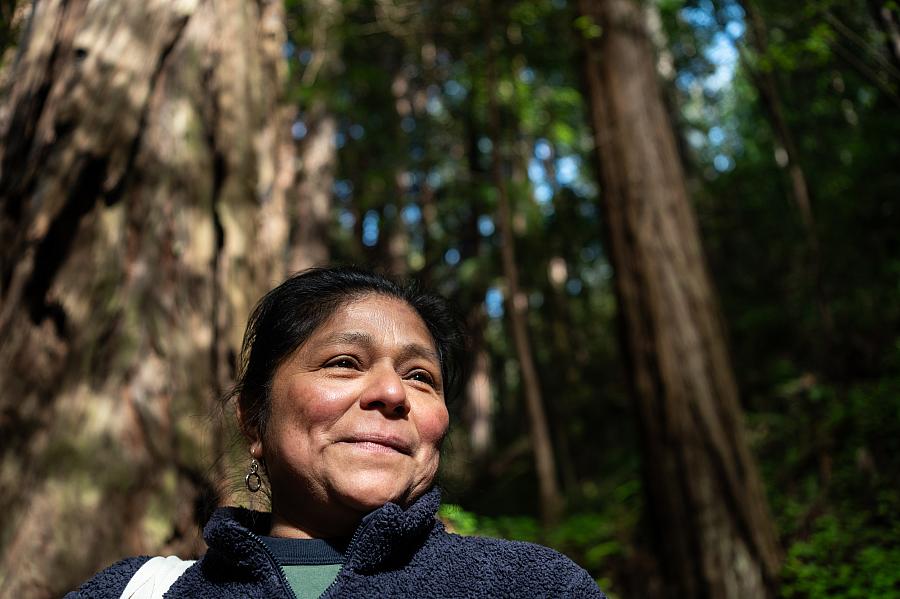
Ana A. looks towards the Redwood trees during a morning hike with the Latina-led community health group, Somos Remedios, in the Muir Woods in Mill Valley, Calif., on April 14, 2025. Photo: Pablo Unzueta for El Tecolote/CatchLight Local
Ana and the other women are part of two community research groups: Somos Remedios, which explores traditional remedies, and Somos Investigadoras, which works to make clinical mental health resources more accessible to monolingual speakers. Both groups grew out of Somos Esenciales, an interdisciplinary project focused on finding solutions to health inequities for San Francisco’s Latino community.
“We come from Nicaragua, Mexico, Peru, Guatemala, El Salvador,” said Ana, who is a researcher for both Remedios and Investigadoras. “It’s multicultural, but we’re very strong. We all want to keep working to gain things for our community, because we’ve gone through many of the same issues, struggling to get medical assistance. We want to get rid of those barriers.”
A pandemic struggle that turned into knowledge
The roots of Somos research stretch back to the early months of the pandemic.
Many of the women first met as volunteers at the Mission Food Hub. Having lost jobs due to shelter-in-place orders and living in tight confines with families or friends, helping others became their refuge.
“I think it saved a lot of us from all of that anxiety and desperation,” said Connie Rivera, a business owner and longtime volunteer. “It got us out of that world that we were living in, and one way or another we started building community.”
In 2021, artist and poet Paul Flores came to the food hub, looking for community members to help him research the pandemic’s disproportionate impact on Latinos in San Francisco’s Mission District — a project that would eventually become Somos Esenciales. Several volunteers found a natural fit. Providing hundreds of people with free groceries every day, they were already deeply connected to the struggles they were being asked to investigate
Flores also recruited writer and researcher Adriana Camarena to help him as a facilitator. Together, they received training and funding to facilitate folklife-based Participatory Action Research, a collaborative research model in which the people most affected by an issue help shape questions, collect data, and interpret findings.
“From the get-go, we started talking about the levels of stress, the emotional burdens, and really the damage that the pandemic was having on our mental health,” said Camarena. “As we formed our questions, we went to learn from the community.”
As Somos Esenciales took shape, 15 volunteers surveyed community members in the food hub, at home, and in bustling areas like the 24th Street BART plaza. They gathered stories of job loss, rent burdens, lingering illness — as well as the deep emotional strain felt amid these concrete hardships. Through art performances and a research paper, they also presented their findings to the community over the following months, catching the eye of local and national organizations.
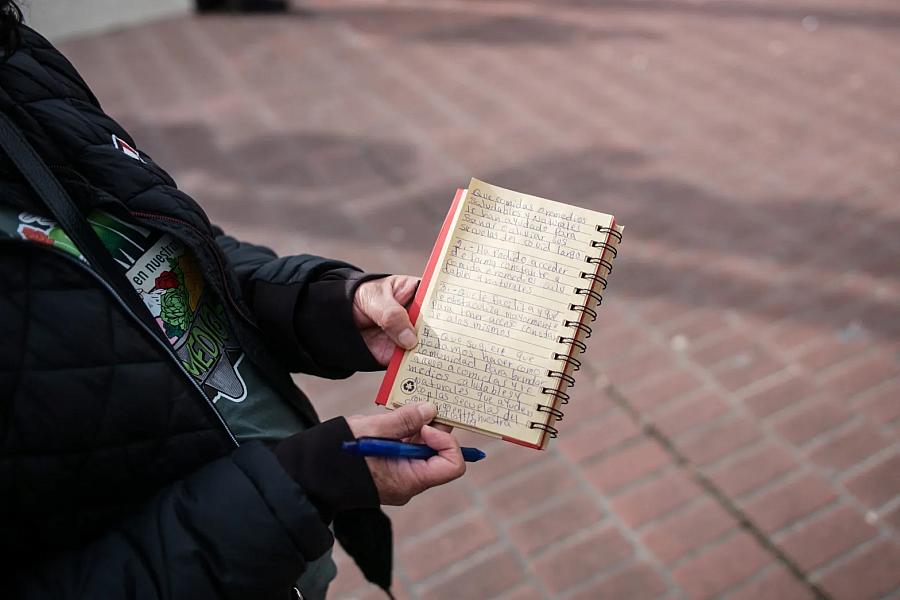
Rosario Ortegón, a domestic worker and community researcher with ‘Somos Remedios’ (We Are Remedies), holds a list of long-COVID related questions for every person they encounter at the 24th BART Plaza in the Mission District, in San Francisco, Calif., on March 4, 2024. Photo: Pablo Unzueta for El Tecolote/CatchLight Local
Weaving a community’s story of recovery
After the first Somos Esenciales project wrapped up at the end of 2022, the group received funding from the University of California, San Francisco (UCSF) for two ongoing spinoff research projects. Both are led by members of the original team, with a few new additions, and all researchers are compensated for their time.
In 2023, Somos Remedios began by investigating the enduring side effects of long COVID and lack of medical treatment options. Many researchers were personally affected — some experienced recurring migraines, while others suffered from mental illnesses like increased anxiety.
“Many people we interviewed told us that what the doctors prescribed them wasn’t helping them,” said Rosario Ortegón, a researcher from Mexico who lost her sense of smell after COVID. “So what they would do is traditional remedies, also to treat mental health.”
This year, the Remedios team is exploring these ancestral practices as a way to improve their emotional wellbeing— from cold plunges to herbal remedies.
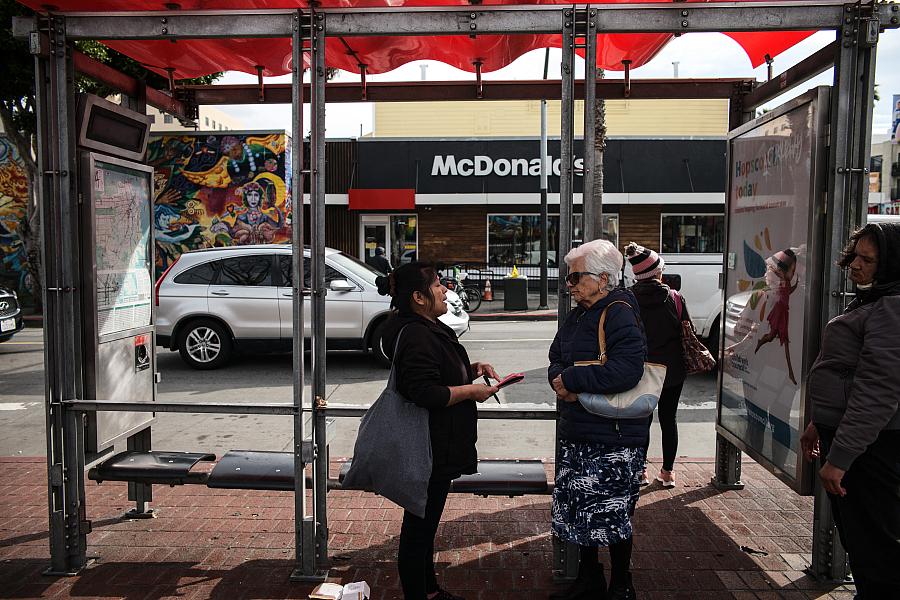
Ana A. asks a person long-COVID related questions at the 24th BART Plaza in the Mission District, in San Francisco, Calif. Photo: Pablo Unzueta for El Tecolote/CatchLight Local
Meanwhile, Somos Investigadoras has been collaborating with UCSF psychologists since 2024. Initially, they focused on how to make mental health resources more accessible to Latino communities, where legal status and language barriers create significant hurdles.
“We were able to realize that talking about mental health is still something that is very stigmatized,” said Magaly, a community researcher involved in both projects. “As we went to the street and talked to our community, we also learnt that it’s hard to find help when you need it, because many people are on waitlists.”
While Magaly and the other community researchers surveyed people around the Mission District, UCSF psychologists returned to the hospital to relay the community’s questions to clinicians on how to access help, said UCSF psychologist Johanna Folk, who co-chairs the committee that works with Somos Investigadoras.
“In our space, everyone is a teacher,” said Monica Noriega, another UCSF psychologist volunteering with the project. She and Camarena are spearheading Investigadoras’ newest project: the long-term effects of immigration trauma.
Finding solace through folklife
As the researchers dig into their community’s struggles, they inevitably confront their own histories with migration. But together, they say, they are finding strength — and healing.
“Each session is very impactful,” said Glenda Hogdson, a participant in both Remedios and Investigadoras. “Despite the fact that this is a project that we’re working on, it’s also in the moment, our therapy. ”
Each small group of researchers meets biweekly for six sessions. They start by sharing personal stories before segueing into a question or idea to investigate. Remedios currently has eight community researchers, including Flores and Camarena, while Investigadoras has seven, in addition to five UCSF psychologists.
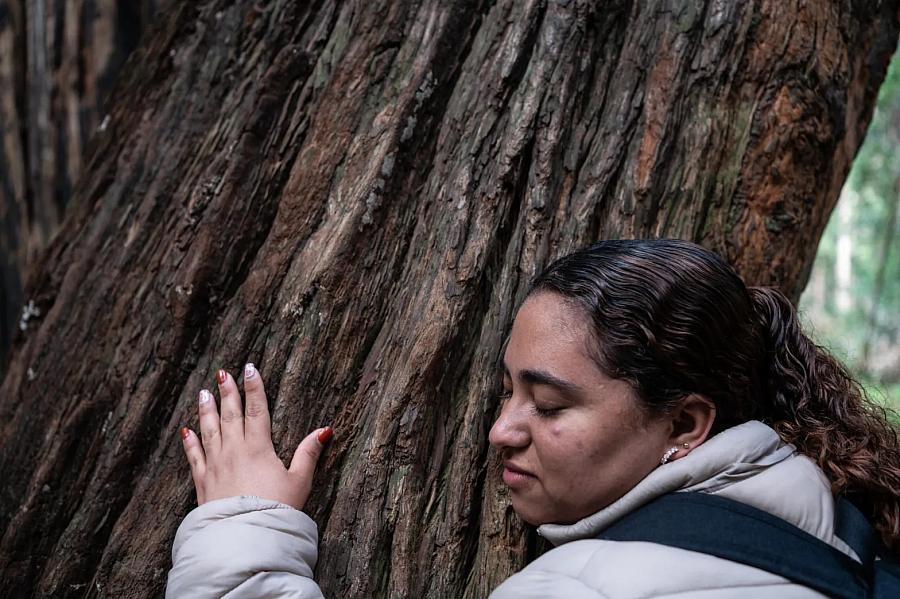
Glenda Hodgson leans onto a Redwood tree for a breathing exercise in the Muir Woods during a morning hike in Mill Valley, Calif., on April 14, 2025. “When I first arrived here in this country I didn’t think about my mental health,” Hodgson said, who fled Nicaragua’s political violence. “Listening to people talk in the Somos group, I realized that a lot of people had been going through similar things.” Photo: Pablo Unzueta for El Tecolote/CatchLight Local
Glenda Hodgson leans onto a Redwood tree for a breathing exercise in the Muir Woods during a morning hike in Mill Valley, Calif., on April 14, 2025. “When I first arrived here in this country I didn’t think about my mental health,” Hodgson said, who fled Nicaragua’s political violence. “Listening to people talk in the Somos group, I realized that a lot of people had been going through similar things.” Photo: Pablo Unzueta for El Tecolote/CatchLight Local
For Hogdson, who immigrated to San Francisco in 2022, the group has become like family. Building a new life in the city was overwhelming, she said, but talking about her experiences with other researchers helped her through her depression. Being part of Somos, she said, also encouraged her to persist in finding a therapist, because she knew she had to keep insisting to get help.
Rivera, who is part of Somos Investigadoras, also says she values the way participants are able to open up to each other.
“Even though it’s private and confidential, I think we all know a lot about each other’s lives,” she said. “And it’s beautiful because you become more vulnerable, you understand someone else more, and they understand you too.”
Building a stronger future
For Ortegón, the most meaningful part of being a researcher has been sharing their findings with the broader community. In 2024, the Remedios team created a “Long COVID lottery,” a board game illustrating the range of symptoms people might experience after infection.
As they passed out the cards at pop-ups throughout the year, Ortegón said she was impacted by the number of people who resonated with the lottery. Some people she talked to told her this was the first time they realized that the medical conditions they now faced were a result of a prior infection.
“Many people would say that it seemed like we were talking about them,” Ortegón said. “That they had been going through similar things since getting COVID.”
On the Investigadoras’ side, the group recently crafted a pamphlet listing mental health resources available for Spanish speakers, which they plan to distribute across San Francisco. They’re also collaborating with El Tecolote to create a bilingual video series sharing the mental health journeys that individual researchers have experienced, to destigmatize the idea of seeking help.
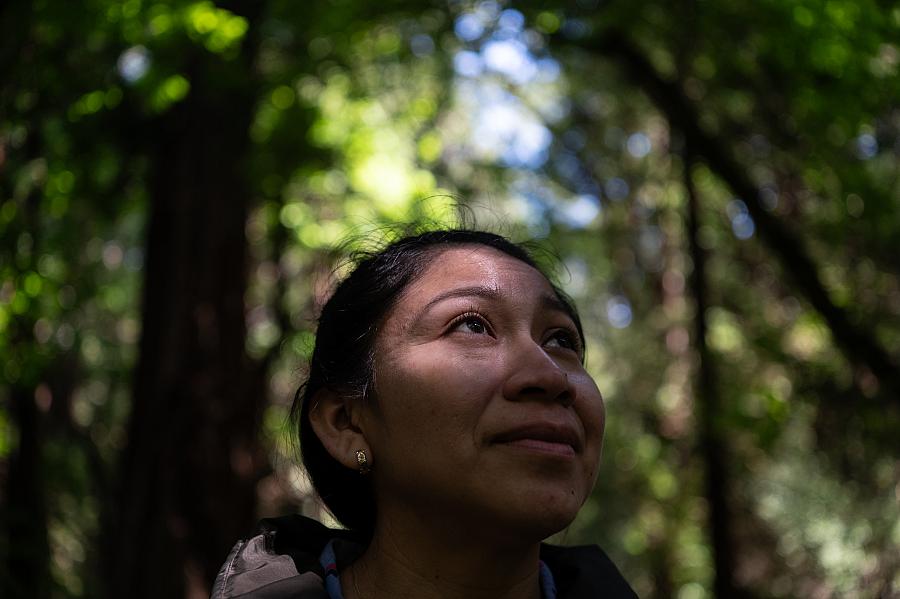
Ana Quintal looks up at the Redwood trees during a morning hike in the Muir Woods in Mill Valley, Calif., on April 14, 2025. Quintal recently joined Somos Remedios, and proposed the hike to the group. Photo: Pablo Unzueta for El Tecolote/CatchLight Local
Driven by what they’ve heard from their community, some members are moving towards deeper interventions. Flores said Somos Esenciales is training some researchers to be full-time mental health advocates, starting with English and technology courses. Roberto Hernández, who heads Cultura y Arte Nativa de las Américas, a nonprofit that now oversees Somos Esenciales, said the group is working to create a community wellness center where people can access mental health resources with fewer barriers.
At the heart of it all, the mission remains simple: making sure that immigrants are better equipped to care for their mental well-being.
“I think what’s important is that all the information, all that we do, gets to the community,” said Magaly. “That’s the point, right? That as many people in this community can use these resources, or whatever it is we can give from all that we’ve learned.”
Acción Latina, the arts and media nonprofit that publishes El Tecolote, also serves as the fiscal sponsor of Somos Investigadoras and Somos Remedios.
This project was supported by the USC Annenberg Center for Health Journalism, and is part of “Healing California”, a yearlong reporting Ethnic Media Collaborative venture with print, online and broadcast outlets across California.

